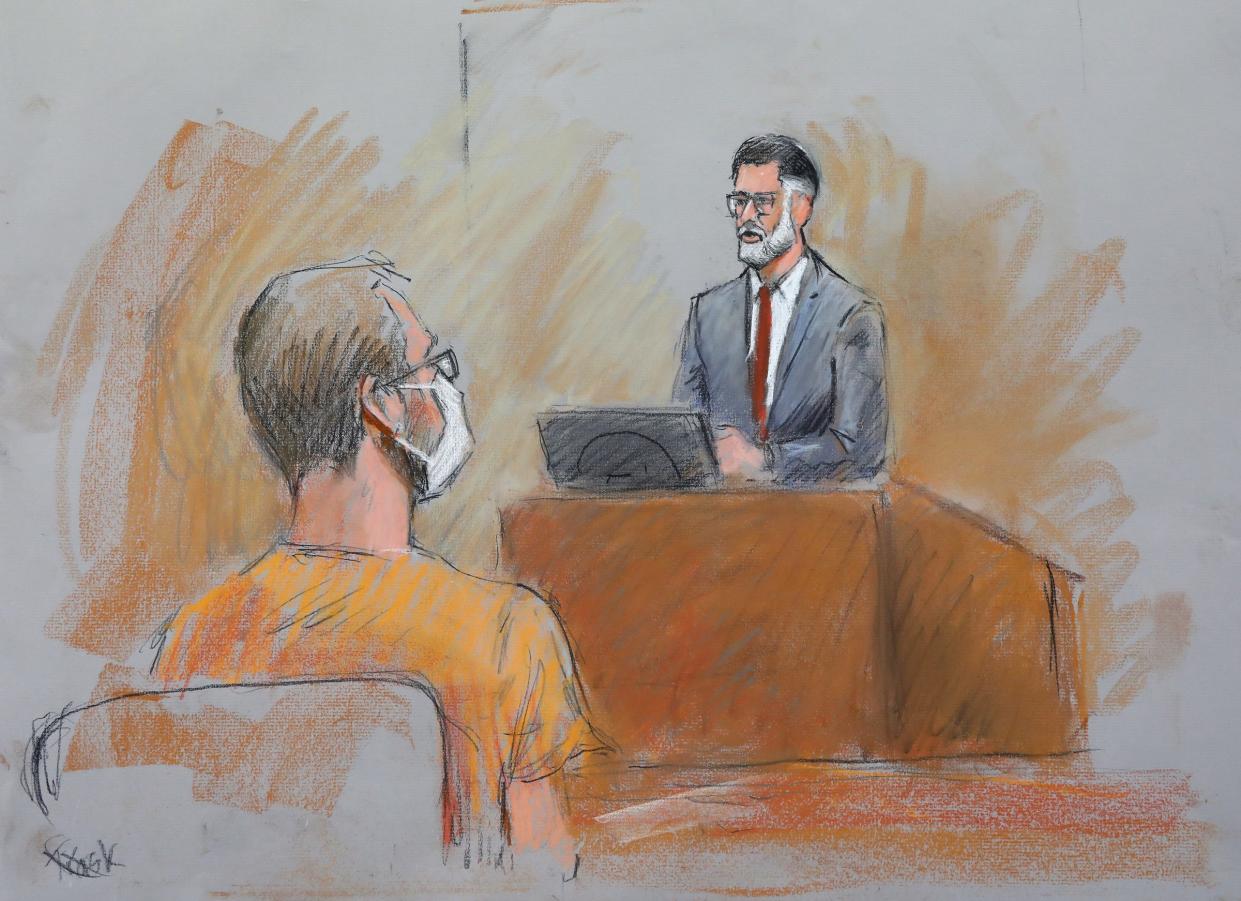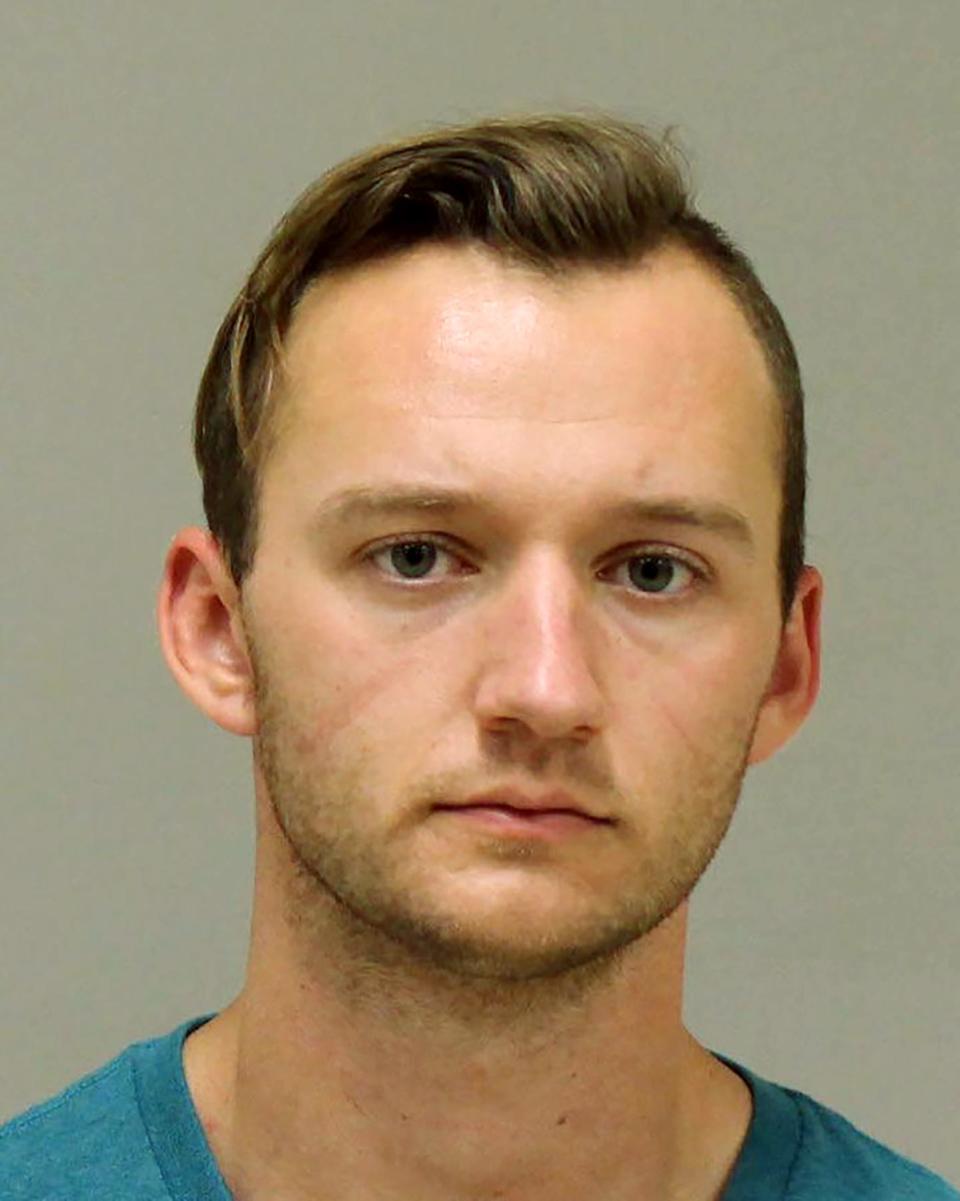Juror falls asleep as defense challenges suicidal Whitmer kidnap plotter

- Oops!Something went wrong.Please try again later.
Kaleb Franks told the jury that he was so depressed in the summer of 2020 that he joined a plot to kidnap Gov. Gretchen Whitmer, hoping to die — and that he did so willingly with no enticing from the feds.
The defense sought to challenge Frank's testimony on Friday, though ran into a logistical problem: a sleeping juror.
A defense attorney expressed this concern to the judge during a midmorning break, saying a male juror had fallen asleep through the morning, and that he had nodded off other days as well.
"Our solution is to keep it interesting," Chief U.S. District Judge Robert Jonker told both sides, adding: "I can sympathize."
Here is what the sleeping juror may have missed:
Defense attorney Christopher Gibbons, who is representing the accused ringleader Adam Fox, sought to poke holes in Franks' testimony that Fox was pushing the kidnap plan the most, and that he talked about it "every time I saw him."
More: Whitmer kidnap plotter: I joined the plan because I was on a suicide mission
More: How 2 militia members turned on their comrades in Gov. Whitmer kidnap trial
On cross-examination, Franks admitted that he didn't like Fox, and that he made some disparaging comments about Fox to the FBI following his 2020 arrest.
Specifically, Franks admitted he told the FBI he thought Fox was a horrible shooter, a bad leader and a "LARPer" — or someone who engages in make-believe or role play, often involving costumes and props.
"That is what I said at the time, yes," Franks said, stressing his previous statements were largely made in an effort to avoid going to jail.
On his first day on the stand, Franks admitted that he lied to police after his arrest to avoid going to prison.

But the defense is trying to convince the jury that Franks is lying again, for the same reason.
Franks, whose lawyer aggressively argued entrapment claims for more than a year, cut a deal with the government and pleaded guilty one month before trial. As part of his plea deal, he agreed to cooperate with the government and testify against his codefendants.
"You'd like to spend as little (jail) time as possible, right," Gibbons asked.
"Without a guarantee, I don't expect anything," Franks said. "I would like that, yes, but they didn't promise anything."
Franks, 27, of Waterford, has not yet been sentenced. His codefendant, Ty Garbin, who was on the stand before him, got six years in federal prison after pleading guilty to kidnapping conspiracy, and could get more time trimmed off for his cooperation and testimony.
Defense challenges suicide plot
Gibbons also questioned Franks about his testimony regarding his suicide plot, and asked him to explain to the jury what his job was that summer.
Franks said he was a drug rehabilitation coach who helped struggling addicts going through the court system, and that he had that job for four years.
Gibbons asked Franks whether, through his work, he was aware of any resources that were available to suicidal individuals.
Franks said that he was. But he never mentioned whether he sought any of those resources for himself — telling the jury only that that he joined the Whitmer kidnapping plot because he wanted to die, and he believed that plan would accomplish his mission.
Defense lawyers asked him whether he ever disclosed that to the group. Franks said he did not.
Julia Kelly, the attorney representing defendant Daniel Harris, also touched on Franks' comments on joining the plot because ofsuicidal thoughts stemming from the deaths of three family members. His mother had died in 2018. His stepfather died in 2016, and his brother died in 2014.
"Those three losses ... were enough to get you to join a conspiracy to end your life," Kelly asked.
Franks said yes, noting he had attempted suicide before and was also facing financial problems in the summer of 2020.
Kelly then asked him why, if he was trying to die, did he take "affirmative steps" at meetings and training exercises to protect his safety, like building walls to prevent bullets from flying everywhere.
Franks said he was concerned about the safety of others.
'The Three Musketeers'
Kelly also challenged Franks about his testimony about a summer hike he took with two codefendants.
Franks testified that he, Garbin and Harris committed to the kidnapping plot while on a hike in Lake Orion on Aug. 5, 2020.
"So like 'The Three Musketeers.' One for all, all for one ... all three of you agreed that you would follow this plan of Adam's?" Kelly asked Franks.
Franks said that's what happened.
Kelly then asked Franks whether he remembered telling the FBI on the day he was arrested in a sting that he "thought Adam’s plan was unrealistic."
Franks said he remembered saying that, but that he only did so because he was scared that day, and feared going to jail.
Michael Hills, who represents Brandon Caserta, also tried to discredit Franks by pointing out his prior statements.
For example, after his arrest, Franks told police that an FBI informant known as Big Dan "fueled Adam's fire." But during his testimony, he told jurors that he didn't think Big Dan pushed the kidnap plotters in one direction or another.
Hills argued that Franks only changed his story after cutting a deal with the government.
"Now, you testified that Dan played it down the middle," Hills said. "That's substantial assistance to the government, right?"
Franks said he has been promised nothing in exchange for his cooperation.
The defense has long argued that the FBI entrapped the defendants, that undercover informants and agents ran the whole show, and enticed the defendants into saying and doing things they wouldn't have otherwise.
The prosecution has scoffed at those claims, telling the jury the defendants were "willing and eager" to kidnap the governor.
'You're a drug addict'
Franks' drug history also came up during cross-examination.
"You are a drug addict ... heroin is your drug of choice," defense attorney Joshua Blanchard told him.
"Fair," Franks answered.
Blanchard then disclosed to the jury that Franks is currently under investigation for using a drug in prison called Suboxone, which is a medication used in treating those addicted to opioids, and helps reduce a person’s urges.
Franks admitted to using the drug, telling the jury he took it only once and told jail officials about it because "it was the right thing to do." He has not been charged over the incident.
Blanchard argued that Franks only reached a plea deal with the government after admitting to taking the drug, and asked Franks whether he was hoping to have the drug charge dropped by testifying.
Franks replied that he knows the consequences of his Suboxone use, that he could still be charged, and his testimony in the kidnapping case has no bearing on that issue.
'I no longer want to end my life'
On redirect, Assistant U.S. Attorney Jonathan Roth sought to argue that Franks' testimony is not based on any promise that he will be spared a lengthy prison sentence.
"Do you still face up to life in prison," the prosecutor asked Franks.
"Yes," Franks answered.
Then came questions about Franks' dislike of Fox.
"Whether you liked him or not, did that control why you got involved in this."
"No," Franks answered.
The prosecutor then brought up Franks' mental health, and whether it had improved.
"I no longer want to end my life," Franks testified. "Given the publicity of the crime, I have discussed this with family members ... I have had help."
But he didn't want his family to know, Franks testified, saying the publicity of the kidnapping case and his detention forced him to communicate with his family about his mental turmoil.
"It wasn't my choice," Franks testified.
Guns, ammo and floral shirts
Following Franks' dismissal, the government called Brian Clark to the stand in the afternoon.
Clark, an FBI special agent, was part of the team that executed a search warrant on the Vac Shack after Fox and others were arrested.
In the courtroom, Clark showed jurors parts of Fox's tactical kit — his assault rifle, fashioned with a red-dot sight and flashlight, a pistol, a gas mask and "flex cuffs," zip-tie-like handcuffs which would have been used on the governor.
He also pulled out a Hawaiian shirt found at the vacuum shop, a reference to the "Boogaloo" movement.
Roth also had Clark point out items in photographs taken when the warrant was executed, including an ammunition case with 100 bullets, a second Smith and Wesson 5.56 rifle, a series of knives, tuna fish packets and more Hawaiian shirts, among other items.
Joshua Miller, a 24-year-old carpenter who joined the Wolverine Watchmen briefly in the summer of 2020, was the final witness to take the stand Friday. He joined the group on a co-worker's recommendation because he wanted more friends.
Miller told Roth he left the Watchmen after realizing he wasn't as committed to anti-government sentiment as the others.
"It wasn't something I wanted to be a part of," Miller said. Miller, who was nicknamed "Purple J" by the group, said he left in August 2020, a month after attending a field training exercise in Fowlerville.
"I remember kind of being put off and not wanting to be a part of that group anymore," Miller said. He described Caserta as intense, based on the conversations he had with him in Fowlerville.
"I would say he sounded very violent and disturbed about what was going on," Miller said.
Miller testified on cross-examination that members were always friendly to him, despite the intense nature of their conversations.
Prosecutors intended to call another FBI witness who specialized in interpreting the chat messages the defendants exchanged, but Jonker decided to dismiss the jury after the witness wasn't at the courtroom immediately after Miller's testimony.
More: Jury hears Whitmer kidnap suspect tell daughter, 10: 'Honey, I'm making explosives'
After the chat specialist, the government will call an undercover agent known to the group as "Red" to the stand. Red will be the second agent who posed as a plotter to reveal themselves in the trial, after FBI Special Agent Mark Schweers testified earlier.
The trial resumes Monday in Grand Rapids.
Contact Tresa Baldas: tbaldas@freepress.com
This article originally appeared on Detroit Free Press: Juror falls asleep as defense challenges Whitmer kidnap plotter

